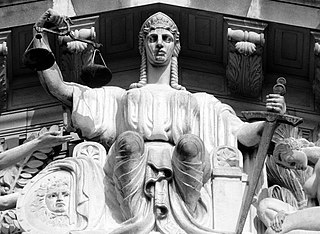An ex post facto law is a law that retroactively changes the legal consequences or status of actions that were committed, or relationships that existed, before the enactment of the law. In criminal law, it may criminalize actions that were legal when committed; it may aggravate a crime by bringing it into a more severe category than it was in when it was committed; it may change the punishment prescribed for a crime, as by adding new penalties or extending sentences; it may extend the statute of limitations; or it may alter the rules of evidence in order to make conviction for a crime likelier than it would have been when the deed was committed.

The Preamble to the United States Constitution, beginning with the words We the People, is a brief introductory statement of the US Constitution's fundamental purposes and guiding principles. Courts have referred to it as reliable evidence of the Founding Fathers' intentions regarding the Constitution's meaning and what they hoped the Constitution would achieve.

Ultra vires is a Latin phrase used in law to describe an act that requires legal authority but is done without it. Its opposite, an act done under proper authority, is intra vires. Acts that are intra vires may equivalently be termed "valid", and those that are ultra vires termed "invalid".
Immigration and Naturalization Service v. Chadha, 462 U.S. 919 (1983), was a United States Supreme Court case ruling in 1983 that the one-house legislative veto violated the constitutional separation of powers.
Stromberg v. California, 283 U.S. 359 (1931), was a landmark decision of the Supreme Court of the United States in which the Court held, 7–2, that a California statute banning red flags was unconstitutional because it violated the First and Fourteenth Amendments to the United States Constitution. In the case, Yetta Stromberg was convicted for displaying a red flag daily in the youth camp for children at which she worked, and was charged in accordance with California law. Chief Justice Charles Hughes wrote for the seven-justice majority that the California statute was unconstitutional, and therefore Stromberg's conviction could not stand.

A no-contest clause, also called an in terrorem clause, is a clause in a legal document, such as a contract or a will, that is designed to threaten someone, usually with litigation or criminal prosecution, into acting, refraining from action, or ceasing to act. The phrase is typically used to refer to a clause in a will that threatens to disinherit a beneficiary of the will if that beneficiary challenges the terms of the will in court. Many states in the United States hold a no-contest clause in a will to be unenforceable, so long as the person challenging the will has probable cause to do so.

In contract law, an arbitration clause is a clause in a contract that requires the parties to resolve their disputes through an arbitration process. Although such a clause may or may not specify that arbitration occur within a specific jurisdiction, it always binds the parties to a type of resolution outside the courts, and is therefore considered a kind of forum selection clause.
In United States law, jurisdiction-stripping is the limiting or reducing of a court's jurisdiction by Congress through its constitutional authority to determine the jurisdiction of federal courts and to exclude or remove federal cases from state courts.

This article summarizes the same-sex marriage laws of states in the United States. Via the case Obergefell v. Hodges on June 26, 2015, the Supreme Court of the United States legalized same-sex marriage in a decision that applies nationwide, with the exception of American Samoa and sovereign tribal nations.
The blue pencil doctrine is a legal concept in common law countries in which a court finds that portions of a contract are void or unenforceable, but other portions of the contract are enforceable. The blue pencil rule allows the legally valid enforceable provisions of the contract to stand despite the nullification of the legally void unenforceable provisions. However, the revised version must represent the original meaning. The rule may not be invoked, for example, to delete the word "not" and thereby change a negative to a positive.
In the law of the United States, federal preemption is the invalidation of a U.S. state law that conflicts with federal law. The rules of preemption seek to restrict it to only where it is explicit or necessary. In the course of adjudicating cases, the issue of preemption may be heard in either state or federal court.

Teo Soh Lung v Minister for Home Affairs is the name of two cases of the Singapore courts, a High Court decision delivered in 1989 and the 1990 judgment in the appeal from that decision to the Court of Appeal. The cases were concerned with the constitutionality of amendments made to the Constitution of the Republic of Singapore and the Internal Security Act ("ISA") in 1989. The latter statute authorizes detention without trial on security grounds. These amendments had the effect of changing the law on judicial review of executive discretion under the ISA by re-establishing the subjective test enunciated in the 1971 High Court decision Lee Mau Seng v Minister for Home Affairs which had been overruled in 1988 by Chng Suan Tze v Minister for Home Affairs, and limiting the right of judicial review to ensuring compliance with procedures specified in the ISA. In other words, the amendments were intended to render the exercise of power by the President and the Minister for Home Affairs under the ISA to detain persons without trial not justiciable by the courts. Both the High Court and Court of Appeal found that these amendments were constitutional because Parliament had done nothing more than enact the rule of law relating to the law applicable to judicial review. Thus, the amendments validly operated to deprive the applicant Teo Soh Lung of the ability to apply to the courts for judicial review.
In Canada, the term quasi-constitutional is used for laws which remain paramount even when subsequent statutes, which contradict them, are enacted by the same legislature. This is the reverse of the normal practice, under which newer laws trump any contradictory provisions in any older statute.

The remedies available in a Singapore constitutional claim are the prerogative orders – quashing, prohibiting and mandatory orders, and the order for review of detention – and the declaration. As the Constitution of the Republic of Singapore is the supreme law of Singapore, the High Court can hold any law enacted by Parliament, subsidiary legislation issued by a minister, or rules derived from the common law, as well as acts and decisions of public authorities, that are inconsistent with the Constitution to be void. Mandatory orders have the effect of directing authorities to take certain actions, prohibiting orders forbid them from acting, and quashing orders invalidate their acts or decisions. An order for review of detention is sought to direct a party responsible for detaining a person to produce the detainee before the High Court so that the legality of the detention can be established.

Exclusion of judicial review has been attempted by the Parliament of Singapore to protect the exercise of executive power. Typically, this has been done though the insertion of finality or total ouster clauses into Acts of Parliament, or by wording powers conferred by Acts on decision-makers subjectively. Finality clauses are generally viewed restrictively by courts in the United Kingdom. The courts there have taken the view that such clauses are, subject to some exceptions, not effective in denying or restricting the extent to which the courts are able to exercise judicial review. In contrast, Singapore cases suggest that ouster clauses cannot prevent the High Court from exercising supervisory jurisdiction over the exercise of executive power where authorities have committed jurisdictional errors of law, but are effective against non-jurisdictional errors of law.
Afrox Healthcare Ltd v Strydom, an important case in South African contract law, was heard in the Supreme Court of Appeal (SCA) on May 13, 2002, with judgment handed down on May 31.
Section 20A of the Immorality Act, 1957, commonly known as the "men at a party" clause, was a South African law that criminalised all sexual acts between men that occurred in the presence of a third person. The section was enacted by the Immorality Amendment Act, 1969 and remained in force until it was found to be unconstitutional in 1998 by the Constitutional Court in the case of National Coalition for Gay and Lesbian Equality v Minister of Justice.

An ouster clause or privative clause is, in countries with common law legal systems, a clause or provision included in a piece of legislation by a legislative body to exclude judicial review of acts and decisions of the executive by stripping the courts of their supervisory judicial function. According to the doctrine of the separation of powers, one of the important functions of the judiciary is to keep the executive in check by ensuring that its acts comply with the law, including, where applicable, the constitution. Ouster clauses prevent courts from carrying out this function, but may be justified on the ground that they preserve the powers of the executive and promote the finality of its acts and decisions.
In law, South African constitutional litigation is the area dealing with the rules and principles concerning constitutional matters in the country of South Africa. It includes the jurisdiction of the Constitutional Court of South Africa, the High Court of South Africa, the Supreme Court of Appeal of South Africa, and certain other specialist courts. It also includes the consideration of rules peculiar to these courts that are relevant to constitutional litigation, such as the admission of an amicus curiae, the duty to raise a constitutional matter as early as possible in proceedings, and the duty to join the relevant organ of state in a case involving a constitutional issue.
A boilerplate clause is a legal English term that is used in conjunction with contract law. When forming contracts, parties to the contract often use templates or forms with boilerplate clauses. Such clauses refers to the standardized clauses in contracts, and they are to be found towards the end of the agreement. Including boilerplate clauses is the process by which parties to the contract may better define their relationship and the will to provide certainty if terms in the contract are ever disputed. Boilerplate clauses are standard contractual terms that are routinely included in many contracts. Some of the most common clause types are listed below:







